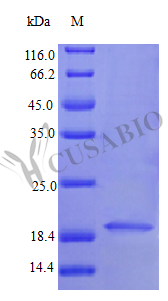Recombinant Human Interferon alpha-1/13 protein (IFNA1) is produced in E. coli, covering the full length of the mature protein from amino acids 24 to 189. This tag-free protein shows a high purity level of over 96%, as assessed by SDS-PAGE, and maintains an endotoxin level below 1.0 EU/μg, determined using the LAL method. The protein appears to be fully biologically active, with a specific activity of no less than 1.0 × 10^8 IU/mg in antiviral assays.
Interferon alpha-1/13 belongs to the type I interferon family and participates in the innate immune response. It seems to play a critical role in antiviral defense by inducing the expression of interferon-stimulated genes and modulating the immune system. This protein may prove important in research focusing on immune responses and viral pathogenesis, potentially providing insights into mechanisms of action and therapeutic applications.
Potential Applications
Note: The applications listed below are based on what we know about this protein's biological functions, published research, and experience from experts in the field. However, we haven't fully tested all of these applications ourselves yet. We'd recommend running some preliminary tests first to make sure they work for your specific research goals.
1. Antiviral Activity Screening and Mechanism Studies
This recombinant IFNA1 protein is confirmed to be highly biologically active (specific activity ≥1.0×10⁸ IU/mg in antiviral assays) and suitable for antiviral studies. The high purity (>96%) and low endotoxin levels support reliable results in viral protection assays. However, researchers should validate the specific ED₅₀ for their viral systems as the provided specific activity is a potency measure rather than a direct concentration-efficacy reference. Different viruses may exhibit varying sensitivity to interferon-mediated inhibition.
2. Interferon Receptor Binding and Signaling Studies
The biologically active IFNA1 is appropriate for IFNAR binding and JAK-STAT signaling studies. The high specific activity indicates proper folding for receptor engagement. However, researchers should note that IFNA1's receptor binding affinity and signaling kinetics may differ from other interferon-alpha subtypes due to subtype-specific variations. Dose-response optimization is recommended for phosphorylation studies rather than relying solely on the specific activity value.
3. Antibody Development and Validation
This high-purity, tag-free IFNA1 serves as an excellent antigen for antibody development. The full-length mature protein (24-189aa) ensures complete epitope coverage. However, antibodies should be validated for subtype specificity as they may cross-react with other interferon-alpha subtypes. The confirmed bioactivity supports the development of neutralizing antibodies, but comprehensive validation should include testing against other interferon subtypes.
4. Protein Structure-Function Analysis
The protein is suitable for structural studies, but researchers should note that the E. coli expression produces a non-glycosylated protein, whereas native IFNA1 may have glycosylation variants. While interferon-alpha is typically less glycosylated than other interferons, structural conclusions should acknowledge the expression system limitations. The high purity supports biophysical characterization, but crystallization may be challenging due to the protein's flexibility.
5. Cell Culture Research and Immune Response Studies
This IFNA1 is appropriate for immune response studies, but the specific activity measurement in antiviral assays may not directly translate to immunomodulatory potency. Researchers should establish dose-response relationships for specific immune parameters (e.g., MHC expression, cytokine production) as different cellular responses may have varying sensitivity thresholds. The low endotoxin ensures specific attribution of effects to interferon activity.
Final Recommendation & Action Plan
This recombinant human IFNA1 is a high-quality reagent with validated antiviral activity, making it suitable for all proposed applications. For immediate use, first establish functional ED₅₀ values in your specific experimental systems, as the specific activity (IU/mg) provides potency information but requires conversion to working concentrations for different assay types. For antiviral studies, the high specific activity ensures effective viral inhibition, but optimal concentrations for each virus-cell system. For signaling studies, the tag-free design ensures authentic receptor interactions, but includes appropriate controls for subtype-specific effects. When developing antibodies, this protein is ideal for generating IFNA1-specific reagents, but validated for cross-reactivity with other interferon-alpha subtypes. For structural studies, the high purity supports biophysical characterization, but consider that the E. coli expression may produce a more homogeneous but non-glycosylated protein compared to native forms. Always include proper interferon response controls (e.g., ISRE-luciferase reporters) to validate pathway activation in new cellular systems.






